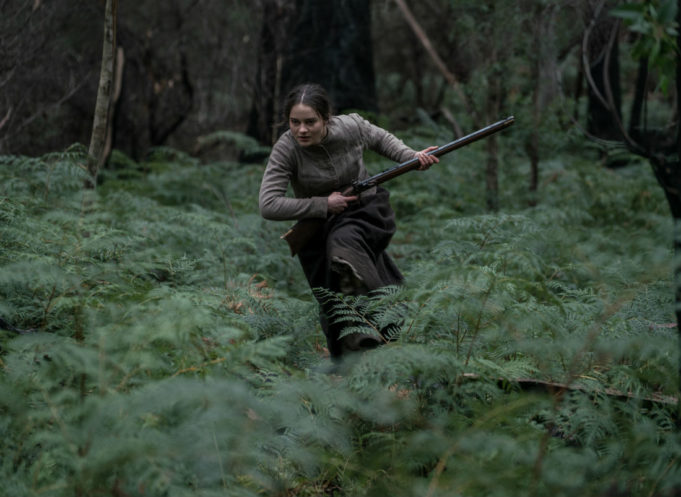Jennifer Kent is relentless. I say that with some degree of certainty, having seen the Australian filmmaker’s harrowing 2015 debut The Babadook and now her follow-up The Nightingale, a bigger, more ambitious historical epic that opens at our local Alamo Drafthouse locations this week and the Grand Berry Theater next week. Strictly speaking, this isn’t a horror film like The Babadook, but there is plenty in it that’s horrifying, and I won’t sugarcoat the numbing cruelty of Kent’s depiction of one woman’s literal rape and a country’s figurative rape. This movie is a mainline of primal female rage, and it’s a load. A big, corrosive, glorious load.
Set in the early 19th century, the film is about Clare Carroll (Aisling Franciosi), an orphaned Irish convict exiled to the prison colony of Australia. She has made a life there, marrying a fellow Irish prisoner (Michael Sheasby) and having his baby. However, she’s an indentured servant to a sadistic British Army lieutenant named Hawkins (Sam Claflin) who refuses to release her from servitude when she’s fulfilled all the conditions. He rapes her just for asking, then has his officers rape her again in front of her husband, who tries to kill them and ends up being murdered along with their baby. With nothing left to lose, Clare grabs her husband’s musket and horse and forces an Aboriginal guide named Billy (Baykali Ganambarr) — whom she addresses as “boy” for much of the proceedings — to lead her north through the wilderness to follow the lieutenant to the city of Launceston, where he’s going to apply for a promotion.
This is kin to many Australian road films such as Walkabout or the more recent Tracks, but instead of the hot, dry, dusty outback, this movie is filmed and set on the island of Tasmania, where the terrain is verdant forest filled with redwood-sized trees and foliage that seems like it belongs on another planet. Cinematographer Radek Ladczuk finds some breathtakingly beautiful visuals to serve as a backdrop to the carnage. At times, the natural scenery recalls Terrence Malick, never more so than when Clare ducks a flying object and sees a yellow-tailed black cockatoo perching serenely on a branch in front of her.
The other powerful tradition that this belongs to is the one of rape revenge films such as I Spit on Your Grave, Elle, and the simply named Revenge. You may find these queasy or satisfying or both, and Kent seems quite aware of both violence’s power to bring a drama to a catharsis and its real-life tendency to take a toll on the perpetrator as well as the victim. Better than any filmmaker I can recall, she splits the difference between these, never more so than when Clare catches up with the young ensign (Harry Greenwood) who killed her baby. Her vengeance is lengthy and brutal and really messy, with the soldier crying out for his mummy before his head is smashed into pulp. After that, Clare’s hallucinations of her dead husband and baby are joined by the soldier, who screams at her through his ruined face. These nightmare sequences are recognizably by the same director as The Babadook, but they’re only part of the story.
That’s because Kent places this plot in the context of a racial hellscape, similar to what Quentin Tarantino did in Django Unchained and Steve McQueen did in 12 Years a Slave. Clare’s journey takes her past butchered bodies of black and white people, especially children. It reminds her and us that while she has suffered greatly, she’s far from alone. The film spends an equal amount of time following Hawkins, who is bad at his job and, like an inept military commander, takes out his frustrations on his men. When his boorish sergeant (Damon Herriman) displeases him, he points his pistol at the officer’s head and makes him kneel and beg for his life. Billy is trying to rejoin the tribe that he was taken away from, and his encounters with other Aborigines are almost all scarring in some way, as he finds evidence that Hawkins and his men are just as keen to rape black women as white ones. For the blacks and most of the whites, this is a savage country, and there’s no question about who the biggest savages are: the white men in the red coats.
I wish Billy hadn’t come across so often like the friendly Indian from old Hollywood Westerns whose knowledge of tracking and surviving the wilderness borders on mystical. Yet Kent gives him a dignity that the Hollywood stereotype doesn’t have. Ganambarr does not hesitate to play up the otherness of this man who sings in his native language and conducts ceremonies whose meaning Clare can only dimly grasp, but his grievances against the white man are wholly understandable, and his attitude toward Clare softens considerably when he discovers that she’s trying to kill the same lieutenant who inflicted so much death and destruction on his people. A great, hushed exchange happens between them late in the film when she asks him whether he has rapists among his tribe and what is done with such men, a scene that’s more haunting because it spurs him to bring about the story’s bloody denouement in Launceston.
The Dublin native Franciosi comes from British TV (including two episodes of Game of Thrones), and she goes convincingly mad during an interlude where she hears Irish fiddle music in the middle of the forest. Yet when she sets her lips together and puts her head down to pursue her quarry, you know that anyone in Clare’s way will pay for it. Clare’s fate is terrifying for being so inevitable — she has a husband who owns a gun and is willing to kill anyone who hurts her, and she herself knows how to deal with soldiers who step out of line when she’s pouring drinks for them. None of it saves her, because Hawkins well knows that a British Army officer can prey on a poor Irishwoman with impunity so far from anyone who he thinks might hold him accountable.
The film is called The Nightingale as a reference to Clare’s fine singing voice, but if you know Greek mythology, you also know of its association with Philomela, the raped Athenian princess who takes revenge on her rapist and is transformed into the bird to escape his punishment. Going back to the ancients, stories about women who were raped have frequently included them having their tongues cut out so they can’t tell their stories. Ultimately, Clare finds peace not in murdering the rapist but in standing up in public and saying what the lieutenant has done. In the end, her act of storytelling is mirrored in the film itself, a woman showing us that rape and murder are the ashes upon which our gleaming civilization is built. It’s up to us to be strong enough to look.
Starring Aisling Franciosi, Baykali Ganambarr, and Sam Claflin. Written and directed by Jennifer Kent. Rated R.












